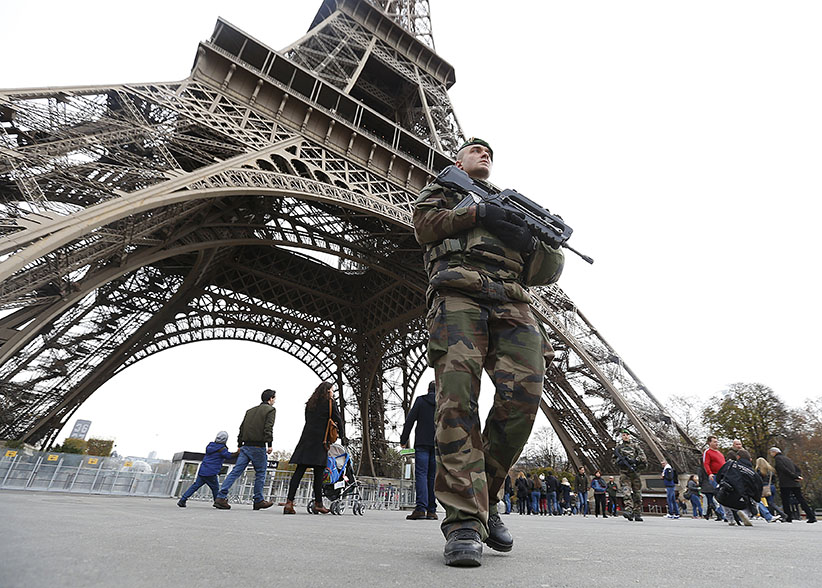Now is not the time to slacken resolve against Islamic State
Editorial: The tide may be turning in the war against Islamic State. Which is why the desperate thugs feel the need to move farther afield.
French military patrol near the Eiffel Tower the day after a series of deadly attacks in Paris , November 14, 2015. REUTERS/Yves Herman – RTS6ZSC
Share

Last week’s bloody attacks across Paris were carried out by so-called Islamic State terrorists who travelled to France from Belgium, following the same route that invading armies have taken for centuries. It is part of the long and complicated history of Paris that it is fated to endure such violent calamities. Certainly no city has shown more resolve in the fight for its own liberty.
But what is significant about these latest indignities is not the targets chosen or the path taken but rather the strategy revealed by the perpetrators. It’s an indication that the West’s fight against Islamic State is finally showing progress. Now is not the time to slacken our resolve.
When Islamic State first appeared on the world stage as heir to al-Qaeda’s bloody mantle, it was a puzzling and mysterious force. Driven by an obscure apocalyptic vision of Islam, it seized control of vast swaths of Syria and Iraq and declared itself a caliphate in fulfillment of ancient prophecy. Unlike al-Qaeda, which focused on acts of mass terror in Western countries, Islamic State operated as a kind of malevolent state government: providing local services and earning money from oil exports while at the same time publicly massacring its enemies, destroying archaeological treasures and engaging in sex slavery.
This geographic presence remains crucial to Islamic State’s self-image, and its ability to recruit jihadists from around the world. Take away its land and it becomes just another faceless group of Islamist thugs. Unfortunately, the United States and its allied powers have been unwilling to commit troops to convincingly defeat Islamic State on the ground. Air strikes and training programs for local forces are preferred to keep Western casualties to a minimum. But air power alone will never dislodge Islamic State, and the quality of the Iraqi army has proven disappointing. This past summer, for example, Islamic State seized Ramadi from a vastly superior Iraqi force.
Lately there’s been reason to believe our local allies have improved their game. The strategically significant city of Sinjar was recaptured last week by Kurdish forces backed by the U.S. Air Force. Iranian-supported Shiite militia have also had some success. The recent appearance of Russia in the region presents another threat to Islamic State’s geographic integrity. It is too soon to declare victory, but the tide may be slowly turning in the ground war against Islamic State.
The attacks in Paris, as well as the bombing of a Russian airliner earlier this month, need to be seen within this context. Exporting terror across borders represents a significant change in effort and image for Islamic State. It is evidence the group is being squeezed in its homeland and feels the need to move farther afield. There is a sense of desperation in these moves.
What does this strategic shift mean for Canada, and Prime Minister Justin Trudeau?
The prospect of Islamic State’s evolution into a “conventional” terrorist organization should help stabilize the volatile Middle East. Shifting the danger abroad, however, raises the risk of new terror acts in Western nations, including Canada. This will require continued vigilance. Since 9/11 our security and legal systems have developed substantial experience dealing with al-Qaeda-type threats. It will never be possible to eliminate every scheme or lone wolf, of course, but the recent sentencing of the Via Rail bomb plotters is a useful reminder of the competency of Canada’s police and intelligence services in this regard.
Further, while we know air power alone is insufficient to defeat Islamic State, in concert with reliable and well-supplied ground troops it is finally proving its utility. During the election, Trudeau vowed to end Canada’s bombing mission against Islamic State in favour of an enhanced role supporting Kurdish allies. But there’s no reason we can’t do both. This is no time to ease the pressure on this group of murderers.
Finally, there’s been considerable debate over Trudeau’s election promise to bring 25,000 Syrian refugees into Canada before year’s end, since one of the Paris attackers may have entered Europe hidden amongst the recent crush of refugees. Trudeau’s commitment remains a worthwhile and noble national goal—and the refugees slated for approval are those considered most vulnerable by the United Nations, many of whom have been in refugee camps for years. That said, it would be foolish to become so fixated on a number or a date that we lose sight of bigger issues. If appropriate security screening procedures delay progress on this file by a few months, no one should consider that a broken promise.
The Paris attacks represent the first major test of Trudeau’s abilities as Prime Minister. We are witnessing a major shift in strategy by our enemies in Islamic State. To check this new threat, he needs to demonstrate an equivalent flexibility.